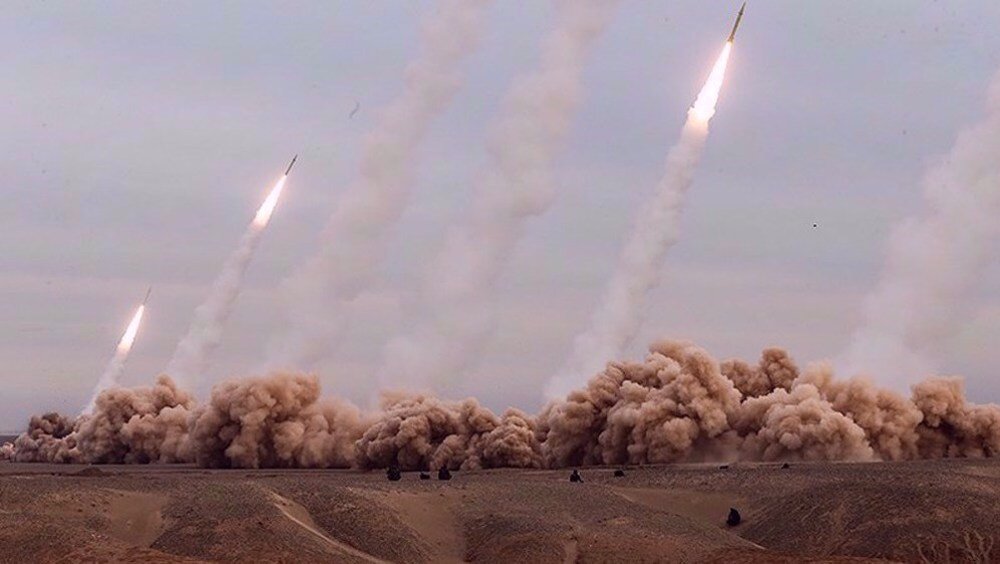Another dashed hope of peace for the Middle East

BEIJING - Recent tensions in the Middle East, especially between Iran and Israel, have deeply concerned me.
Not only because my job involves international news commentary, but also because I used to work in Iran for more than two years, where I have many friends.
After Iran's Islamic Revolution Guards Corps launched missiles and drones at Israeli targets on the evening of April 13 in retaliation for an earlier strike on Iran's consulate in Syria, while waiting for Israel's response, I was chatting with my Iranian colleague on WeChat, a Chinese instant messaging app. He expressed his concern: "I am a bit worried. I think Israel will retaliate, but I don't think it would risk and take the trouble to enter a full-fledged war."
I told him that if the situation escalated, I would be willing to return to Iran to report. He replied, "I miss you, but hope that you do not come to Iran unless in a peaceful atmosphere."
His assessment turned out to be correct. I worked in Iran from March 2021 to April 2023. Not long before I returned to China, a wave of reconciliation swept across the Middle East, bringing hope and optimism to the region, which is known for its complex geopolitics.
During that time, fewer people in China asked me about the dangers of the Middle East, and more people inquired about traveling to Iran and other Middle Eastern countries.
The highlight of the regional reconciliation was on March 10 last year when Iran and Saudi Arabia, mediated by China, agreed to restore diplomatic relations. While I was still working in Iran that day, my phone buzzed with notifications reporting this significant breakthrough in Beijing.
This major and unexpected news made headlines in major Iranian newspapers and excited taxi drivers on the streets of Tehran when they heard I was Chinese, eagerly sharing their joy with me.
In that period, Syria rejoined the Arab League, and countries like Saudi Arabia and the UAE reconciled with Qatar, ending the blockade imposed on the latter since 2017.
The internal factors behind the wave of reconciliation included Middle Eastern countries focusing on domestic progress, and proactively improving development environments.
Externally, Middle East rapprochements were related to U.S. strategic pivot away from the Middle East to the Asia Pacific, giving Middle Eastern countries a chance to ease relations with regional adversaries.
Meanwhile, the contributions of peace advocates like China have played a crucial role in facilitating reconciliation in the region. As a Chinese journalist, I take pride in the fact that my country has played a significant role in advancing peace in the Middle East.
However, in October last year, Hamas attacked Israeli targets, and Israel then launched aerial bombardment and ground operations in Gaza. A new round of Israeli-Palestinian conflict erupted, plunging the Middle East back into turmoil despite the overall peaceful atmosphere brought about by the reconciliation.
Israeli military actions in Gaza have so far resulted in over 34,000 deaths, with more Gazans grappling with starvation and teetering on the brink of death. This round of Israeli-Palestinian conflict continues to spill over, causing tension in multiple directions in the region. Hezbollah in Lebanon and the Houthi rebels in Yemen have clashed with Israel to show support for the Palestinians. An airstrike on April 1 killed several senior Iranian commanders at Iran's embassy complex in Syria, drawing Iran directly into the tensions.
Fortunately, as of now, this Iran-Israel clash has not escalated into a large-scale conflict.
On April 14, the Chinese Foreign Ministry urged restraint and calm. It also underscored the urgent need to swiftly quell the Gaza turmoil. Chinese Foreign Minister Wang Yi on April 15 held calls with counterparts from Iran and Saudi Arabia, vowing Beijing will work to avoid further escalation of confrontation.
Similar to other responsible members of the international community, China's primary aim is to prevent the Middle Eastern countries from descending into a cycle of tit-for-tat retaliation. China's strong diplomatic ties with many Middle Eastern nations facilitate effective coordination among them.
While China is actively mediating for peace in the Middle East, the United States repeatedly demands China influence Iran and blames China for not influencing Iran according to Western wishes as one of the reasons for the tense situation in the Middle East.
These viewpoints have two inaccuracies. First, China does not view economic exchanges and other forms of inter-country relations as geopolitical tools, let alone using them to manipulate other countries. Second, the primary key to easing tensions in the Middle East is for the United States to restrain Israel.
Both Democratic and Republican parties in the United States struggle to break free from the influence of Jewish lobbying groups, which have impacted the core of U.S. Middle East policy. It's the United States' pro-Israel stance that consistently exacerbates tensions in the region.
While Washington frequently makes verbal commitments to peace, primarily to appease domestic anti-war protests and to garner votes in the upcoming presidential elections, its actions tell a different story. It has consistently provided military support to Israel and repeatedly vetoed UN Security Council resolutions regarding a ceasefire in Gaza. In the long term, Washington has pursued a divisive strategy in the Middle East, exploiting regional conflicts and promoting arms sales for regional dominance.
Most recently, the United States on April 18 vetoed a draft resolution advocating for Palestine's full membership in the UN, dashing the decades-long aspirations of the Palestinian people.
China will continue to work alongside the international community to restore peace, save lives, and promote justice. The United States should also take responsibility for its role in the conflicts in the Middle East instead of shifting blame onto other countries.
Gao Wencheng is a commentary writer at the International News Department, China’s Xinhua News Agency. He used to work in the agency’s Tehran office from 2021 to 2023.
Leave a Comment